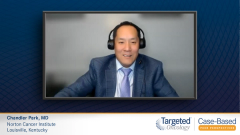
A 51-Year-Old Man with Renal Cell Carcinoma
Chandler Park, MD introduces a renal cell carcinoma (RCC) patient case, sharing his initial impressions and discussing treatment approaches.
Chandler Park, MD: My name is Dr. Chandler Park. I'm a genitourinary oncologist at Norton Cancer Institute. Today, we have a very interesting case on renal cell cancer, and so, it's something that I want to share. There's a lot of good teaching points here, so we'll go ahead and get started. AL is a 51-year-old man who visited his primary care physician in clinic. He reported persistent fatigue, hematuria, and recent weight loss of 15 pounds. Past medical history of hypertension, well-managed with medication. Past social history of smoking, but no alcohol use. In terms of current clinical workup and diagnosis, hemoglobin of 10.8, gram per deciliter, ANC and the white blood cell count is normal. Platelet count of 316,000 per liter, and calcium at 9.7 mg per deciliter. ECOG performance status of 1. Patient underwent a CT scan of the abdomen and pelvis, and it showed a large right-sided renal mass measuring 11.1 cm with extension into the renal vein. Pathology and histology results confirmed the diagnosis of pT3ANONO staged 3 confirmed clear cell renal cell cancer. Now in terms of treatment, our patient underwent a nephrectomy with limited lymph node dissection after a medical oncologist evaluated the patient. Patient was started on adjuvant therapy of pembrolizumab, 200 mg IV every three weeks.
Just looking over the case, we do have one piece of information that's missing that I use for my patients, and that's called the Fuhrman Grade score of the pathology. For instance, Fuhrman Grade is something that's in all pathological reports for clear cell renal cell, and they come in at 1,2,3, and 4 tends to be a very aggressive type of clear cell renal cell, while I tends to be the less aggressive. And so, 2 and 3 is in the middle. Now, the reason I bring that up because that helps us with prognosis. We have something called a UCLA integrated staging system for renal cell cancer that I use in my practice that helps us evaluate the risk of recurrence. And so, the UCLA integrated staging system, also UISS, we look at factors such as 1). In our patient who has localized disease, 2). The clinical stage T3. 3). We'll say our Fuhrman stage is 3, and then, 4). which is given is ECOG performance status. So using those factors, we calculate the risk score, and so, for our patients - our patient is considered a high risk. Now, there are three different risks involved here in terms of adjuvant treatments. One is called the intermediate risk, and for intermediate risks based upon the 5-year disease-free survival for UISS, is 80%. Our patient here actually falls into the high risk, and that is a 5-year disease-free survival of 55%. And then, we also have a special group of patients where they have metastatic disease whether it be in the adrenal gland or in the lung, and those areas are resected. They're called M1 because it's outside of the kidney. It's removed, so it's called "No evidence of disease." Now, those patients have a 3-year disease-free survival of 20%. So those are very high risk patients. In terms of your question; what is my initial impression? Our patient is considered a high risk for recurrence. Do you agree with pembrolizumab in the adjuvant setting? Yes, I do, with the caveat that the patient had at least a Fuhrman 3 or a 4. And which patient is pembrolizumab in the adjuvant setting best suitable for? I would say for the patients with high risk after a nephrectomy.
The other adjuvant treatment that could be considered for our patient - It's a category 3 in the NCC and guidelines, and that is sunitinib. Sunitinib is a Tyrosine Kinase inhibitor. Would I consider for this patient? The answer is "No." And as an oncologist, I have to consider risk versus benefit. And in terms of the risk with this medication, it causes a lot of hand-foot disease, hypertension, and so, it is the category 3 of the NCC and guidelines, but I would not consider it for this patient in my practice.
Transcript Edited for Clarity

















